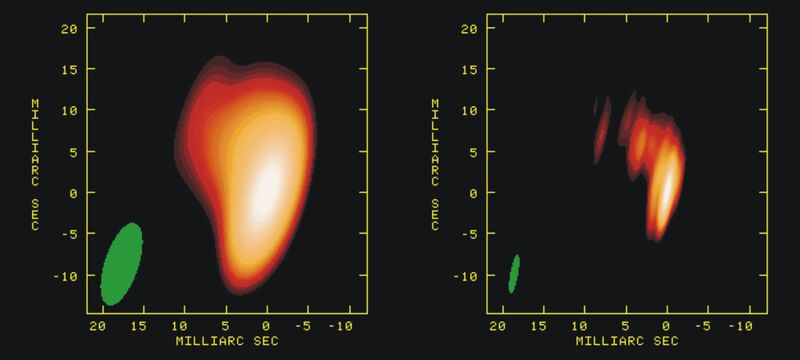VLBA & HALCA Images of Quasar 1156+295
Description
The quasar B2 1156+295 as seen using the HALCA satellite in conjunction with the VLBA. The left-hand panel is an image of the quasar made at 1665 MHz with the VLBA. The right-hand panel is the same image as on the left, except that interferometer baselines between the VLBA antennas and the HALCA spacecraft have been included; these longer baselines provide the higher angular resolution apparent here. This right-hand image shows the quasar's core, bottom right, and a stream of radio emission emmitted by a jet of subatomic particles emerging from the core toward the top left. The green circle in the bottom left corner of each image shows the intrinsic resolution of the image, or how big a point source would appear in the image The observations were conducted on June 5, 1997, approximately four months after the launch of the HALCA satellite. This is the second image ever made using a space-based radio telescope, and the first to show appreciable structure. Astronomers and computer scientists used a special-purpose computer to digitally combine the signals from the satellite and the ground telescopes to make them all work together as a single, giant radio telescope. This dedicated machine, the VLBA Correlator, built as part of the VLBA instrument, was modified over the previous four years to allow it to incorporate data from the satellite.
HALCA, launched on Feb. 11 1997 by Japan's Institute of Space and Astronautical Science (ISAS), is the first satellite designed for radio astronomy imaging. It is part of an international collaboration led by ISAS and backed by NRAO; Japan's National Astronomical Observatory; NASA's Jet Propulsion Laboratory (JPL); the Canadian Space Agency; the Australia Telescope National Facility; the European VLBI Network and the Joint Institute for Very Long Baseline Interferometry in Europe. The first observations with HALCA were conducted on May 22 1997, of the distant active galaxy PKS 1519-273. The second observation took place on June 5th 1997, when HALCA observed the quasar 1156+295.
Creator
Legacy Astronomical Images
Rights
NRAO/AUI/NSF does not hold full copyright for this image. Contact the archivist for details.
Type
Legacy Astronomical Image
Object Name
4C 29.45
Investigators
Jim Ulvestad, Jonathan Romney
Telescope
Very Long Baseline Array (VLBA)
HALCA
Observation Date
1997-06-05
Type of Observation
continuum
Band
L
Wavelength
20 cm
Frequency
1.4 GHz
Center of Image
RA 11:59:31.830, Dec: 29:14:43.800 (J2000)
Field of View
0.000100 x 0.000100 degrees
Notes
Contact the archivist for a high resolution tif of this image.
Series
Active Galactic Nuclei Series
Unit
Quasars Unit
Citation
Legacy Astronomical Images, “VLBA & HALCA Images of Quasar 1156+295,” NRAO/AUI Archives, accessed April 1, 2025, https://www.nrao.edu/archives/items/show/33335.

